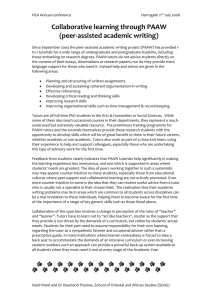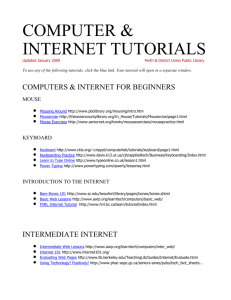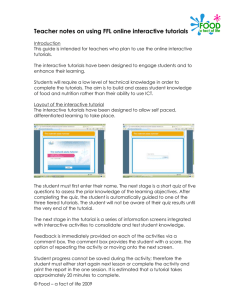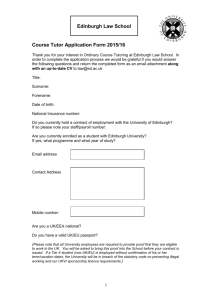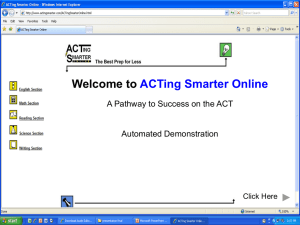Tutorial services for students at Bilkent University An
advertisement
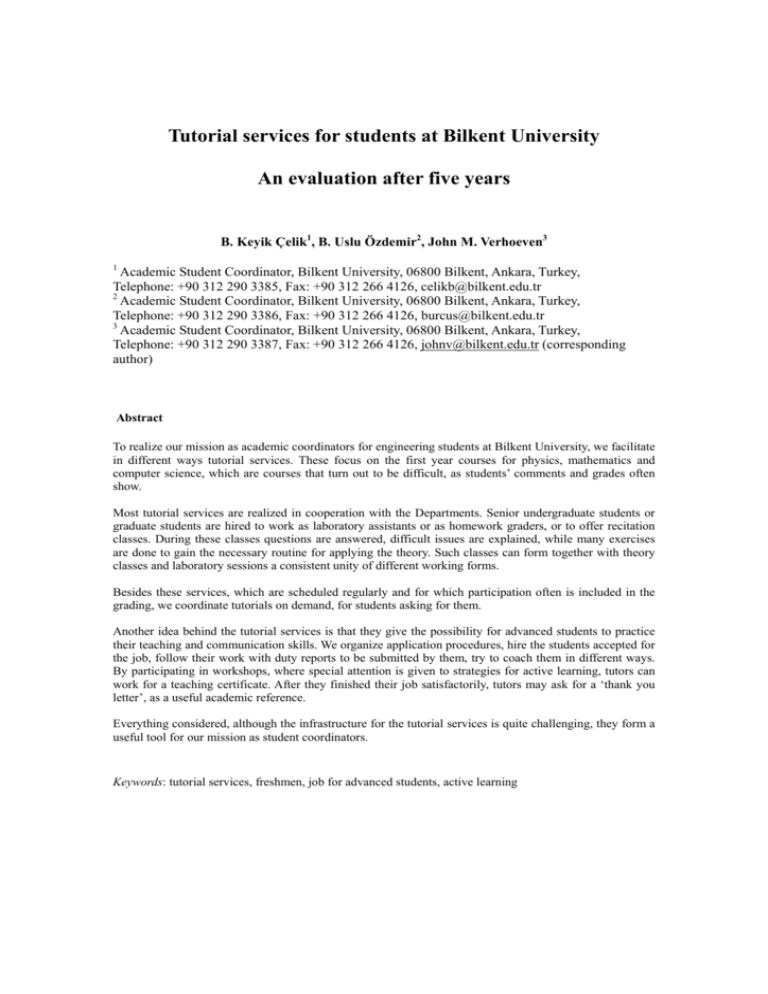
Tutorial services for students at Bilkent University An evaluation after five years B. Keyik Çelik1, B. Uslu Özdemir2, John M. Verhoeven3 1 Academic Student Coordinator, Bilkent University, 06800 Bilkent, Ankara, Turkey, Telephone: +90 312 290 3385, Fax: +90 312 266 4126, celikb@bilkent.edu.tr 2 Academic Student Coordinator, Bilkent University, 06800 Bilkent, Ankara, Turkey, Telephone: +90 312 290 3386, Fax: +90 312 266 4126, burcus@bilkent.edu.tr 3 Academic Student Coordinator, Bilkent University, 06800 Bilkent, Ankara, Turkey, Telephone: +90 312 290 3387, Fax: +90 312 266 4126, johnv@bilkent.edu.tr (corresponding author) Abstract To realize our mission as academic coordinators for engineering students at Bilkent University, we facilitate in different ways tutorial services. These focus on the first year courses for physics, mathematics and computer science, which are courses that turn out to be difficult, as students’ comments and grades often show. Most tutorial services are realized in cooperation with the Departments. Senior undergraduate students or graduate students are hired to work as laboratory assistants or as homework graders, or to offer recitation classes. During these classes questions are answered, difficult issues are explained, while many exercises are done to gain the necessary routine for applying the theory. Such classes can form together with theory classes and laboratory sessions a consistent unity of different working forms. Besides these services, which are scheduled regularly and for which participation often is included in the grading, we coordinate tutorials on demand, for students asking for them. Another idea behind the tutorial services is that they give the possibility for advanced students to practice their teaching and communication skills. We organize application procedures, hire the students accepted for the job, follow their work with duty reports to be submitted by them, try to coach them in different ways. By participating in workshops, where special attention is given to strategies for active learning, tutors can work for a teaching certificate. After they finished their job satisfactorily, tutors may ask for a ‘thank you letter’, as a useful academic reference. Everything considered, although the infrastructure for the tutorial services is quite challenging, they form a useful tool for our mission as student coordinators. Keywords: tutorial services, freshmen, job for advanced students, active learning 1. INTRODUCTION The main objective of the Academic Student Coordination Unit of the Faculty of Engineering of Bilkent University [1] is to help its first year students adapt to university life and start the academic study effectively. Besides giving attention to the first year students in particular we aim at being a service centre for all the students of the Faculty of Engineering. To meet these objectives, we offer a variety of services and programs and encourage students' participation in a wide range of activities. As tutorial services we facilitate tutorials for courses for physics, mathematics and computer science and enable advanced students to practice their teaching and communication skills by hiring them as tutors, graders or laboratory assistants for these courses. In this paper is discussed whether such tutorial services are useful tools for our mission as academic student coordinators. Developments since the start of our office are described and some survey results are given. 2. BACKGROUND When we came into office in September 2003, counseling services for individual students or small groups of students were offered by staff members of the Faculty of Engineering. Either the students were contacted if considered necessary, or students contacted their advisor or other faculty members, as they preferred. Besides this, in spring 2003 beginnings had been made with somewhat regularly scheduled helping sessions for first year students in need of extra coaching for basic science courses. As a strategy to get more structure in such services, we organized many helping sessions for Physics and Calculus, scheduled for all first semester students in engineering. These classes were offered by junior or senior students of the Faculty of Science and of the Faculty of Engineering. In cooperation with instructors and administrators we tried to improve this framework. The coordination and organization of these tutorials was quite problematic. Firstly, it was very difficult to make efficient schedules of the tutorial classes between the 'normal' classes. Then, there was no clear tool to motivate the students to participate in the tutorials, besides advising them to do so. It turned out to be essential to have a clear division of responsibilities between our office and the departments of the Faculty of Science. 3. THE TUTORIAL SERVICES 3.1 Operational definitions Generally, a tutorial is interpreted as ‘a lesson for an individual student or a small group of students’. A tutor is seen as a ‘private teacher’, or as someone who ‘advises students on their work or helps them if they have problems in their private life’. Although tutorials can be offered as a commercial service [2], we will only give attention to tutorials offered by a university, as organized for example by Katholieke Universiteit Leuven [3] or by Tilburg University [4]. In this paper we focus on course specific tutorial services, for the sake of courses for mathematics, science or technology. Tutorials for general skills, for example as offered as a part of our orientation course for freshmen in engineering [5], will not be discussed here. Also tutorials in terms of personal coaching sessions, for example as offered to students who contact us for many different questions or problems [1], will not be discussed here. Within these limitations we use several specific interpretations for a tutorial service in this paper. Firstly, we define it as a regular class, scheduled in cooperation with departments, as a service for beginning students taking a course. Secondly, we interpret it as a service on demand, only scheduled after individual students or small groups of students asked for it. Thirdly, we see it is a service for advanced students, enabling them to practice a teaching job. 3.2 Tutorials in cooperation with departments During the period between fall 2003 and fall 2005, due to the freshmen students’ deficiency in science and mathematics courses, we organized additional support for physics and calculus. Tutorials were offered by junior or senior students for groups of about fifteen students. For the fall semesters all freshmen were scheduled to attend these tutorials, for the spring semesters only the unsuccessful students were particularly advised to participate in the tutorials. Among the science courses Physics was seen as one of the most difficult courses of the first year, as was clear from students' comments and from their grades. The tutorial hours for physics were not additional lecture hours where the students were consuming knowledge, but hours where the students should work with the issues themselves, where they should discuss difficult points, should come up with questions, should solve additional problems, should gain the necessary routine, should try out whatever they like to. Such tutorials should form together with the theory classes and laboratory sessions a consistent unity of different working forms. But, although the students were advised to use such tutorial services, many students did not participate. In a group of more than 100 students who took the course Phys101during fall 2004, when asked whether they attended the tutorials, 39% of the students answered that they 'seldom' attended; while 19% answered that they 'never' attended. So, almost 60% did not attend 'regularly', let alone 'frequently'. And for spring 2005 this figure was even more than 70%. Such a pattern, that the majority of the students enrolled for physics tutorials did not attend the tutorials regularly, was confirmed by attendance lists. Only a few students succeeded in using the tutorials as they were intended to be, as a regular class hour throughout the semester. Most students were inclined to use these tutorials not as regular hours, but only once and a while, as an emergency service, e.g. as an extra help session just before an exam, when many students were interested all of a sudden, even for extra tutorials in the weekend. As a reason why they did not attend these tutorials, the students often referred to their total amount of scheduled hours during the week, more than 30. The higher the working load in terms of scheduled hours, the fewer hours remain for self study, also while such tutorial classes were usually scheduled during late afternoon hours. For tutorial hours for Calculus, intended as a service which should form an effective combination with lecture hours in the same way as described above, we were confronted with similar problems. After some semesters a different organization turned out to be less problematic. Starting from 2006 the tutorial classes were offered by MS or PhD students, under full responsibility of the Faculty of Science, while we were tracing the feedback given by the students. Several frameworks were used, mostly depending on how the tutorials were included in the grading for the courses. 3.3 Tutorials on call We see tutorials on call as an essential tool for the active learning process of the students. As they ask for the service by themselves, they are motivated for it, while it requires from them to be assertive, to take the initiative to contact us. Until now, although students seem to like the possibility for such a service, they use it very rarely. They might not be used to it because of several reasons. One of them is the culture of the secondary education which shaped the background of our students. As such, we see tutorials on call as a new development, although such services are widely used elsewhere, for example at Stanford University [6], the University of Connecticut [7], Syracuse University [8], and Illinois State University [9]. Since 2006 we try to initiate tutorials on call. So, in November 2006 a tutorial was organized for some students for the basic physics course Phys101, after these students contacted us just before a midterm exam. The tutor was positive about this framework and so were the students who participated. Also for the computer science courses CS111 and CS201 tutorials were organized, even more than once, based on students’ requests. We try to improve this framework, focusing on basic courses for physics, mathematics and computer science. The tutorials are organized by us and offered without any involvement of the instructors responsible for these courses. 3.4 Jobs for advanced students Besides individual counseling for advanced students [1], a service for these students is to help them to practice their teaching skills by enabling them to have a job as a tutor before they leave the university. This fits in our mission as student coordinators, because practicing teaching skills is a tool for their active learning, helping them not only to improve their pure scientific and technical skills, but also for them to get to know better their personal interests, styles and characteristics. To realize this, we take a role as an employer. At the beginning of each semester we organize an application procedure [10], based on the needs of tutors for the Departments of Physics, Mathematics and Computer Science. We hire the tutors and have them working for these Departments. While the tutors are working for the instructors responsible for the courses, we follow their working load and pay them accordingly. This way, advanced students have possibilities to work as a tutor, by offering classes as described in 3.2. They also can work as assistants in laboratory classes for Physics or Computer Science, they can be hired to work as a grader for homework assignments for courses for Mathematics or Physics, or they can be a free lance tutor as described in 3.3. In cooperation with the Faculty of Education and with the ‘Centre for Teaching Excellence’ of Bilkent University, we used to organize educational coaching for all these student tutors. The tutors were observed, video-registrations of their performance could be made, while workshops were offered during their period on duty, mainly to help them to apply strategies for active learning. We had possibilities to reward tutors with a teaching certificate, based on their total performance, active participation in the workshops included. Also, a tutor has possibilities to ask for a letter of reference, valuable for applications for other jobs or just for the CV. 3.5 Some evaluation results In 2007 we employed undergraduate student tutors for the first year Computer Engineering courses. The evaluations at the end of the semester by the students taking these classes rated the junior or senior student tutors at the same level as MS or PhD students. On a level of 1 to 5, with 3 being the neutral position, only about 8% of the students replied negatively on the 3 survey questions about the tutors. These questions were about 'preparedness of the tutor', 'interaction with the students' and 'the overall performance of the tutor'. The physics department organizes its own tutorials for the first year classes. These tutorials do not have a regular schedule and the frequency of the sessions is not homogeneous among different sections. In spring 2007 the students rated the effectiveness of the tutorials as 3.2 out of 5. About 63% of the students thought that their assistant in the tutorials had come prepared to the sessions. In fall 2007 the effectiveness ratings dropped slightly to 3.0. Only 46% of the students thought that the assistant had come prepared. Calculus classes organized by the Department of Mathematics have a regular schedule. Attendance to the tutorial sessions was reinforced by in-class quizzes. As a result, only 4% of the students replied negatively regarding their attendance regularity for both 2007 spring and fall semesters. The result rates about effectiveness of these tutorial sessions were 3.4 and 3.8 in spring 2007 and fall 2007 respectively. Overall, only about 5% of the students remarked negatively about the preparedness of the tutorials. The weighted overall grade in this category was 4.1 in spring 2007 and 4.3 in fall 2007. 4. CONCLUSION The tutorial services described above, although still quite challenging and in need of improvements, can be seen as useful tools for our mission as academic student coordinators. We consider improvements of the services along several lines. Firstly, tutorials on call could be used more frequently. To realize this we can get inspiration from experiences elsewhere, but it takes time to really get such infrastructures accepted in our educational culture. Secondly, depending on preferences expressed by students, tutorial services could also be offered for other courses besides the ones mentioned in this paper. Thirdly, attention could be given to coaching of tutors not just during their period on duty but also before they start their job. Acknowledgements Without cooperation with instructors and administrators of the Faculty of Science and of the Faculty of Engineering the developments discussed here could not have been made. We are also thankful for the inspiring discussions we had with and the help we received from staff members of the Faculty of Education and from Jerry Spring of the ‘Centre for Teaching Excellence’ of Bilkent University. References [1] B. Keyik Çelik, B. Uslu Özdemir, John M. Verhoeven, ‘Coaching engineering freshmen at Bilkent University’, SEFI 2005 Proceedings [2] Online Tutoring Homework Help for Students, http://www.tutor.com [3] University tutoring, Katholieke Universiteit Leuven, http://www.kuleuven.ac.be/english/teaching/tutoring.htm [4] Tutoring and coaching, Tilburg University, http://www.tilburguniversity.nl/students/tutoring/ [5] B. Keyik Çelik, B. Uslu Özdemir, John M. Verhoeven, ‘An orientation course for freshmen in engineering’, SEFI 2006 Proceedings [6] The Center for Teaching and Learning, Stanford University, http://ctl.stanford.edu/Student/find_a_tutor.html [7] Institute for Teaching & Learning, Quantitative Learning Center, University of Connecticut, http://qcenter.uconn.edu/ [8] The Tutoring and Study Center, Syracuse University, http://provost.syr.edu/provost/Units/academicprograms/tutoring/index.aspx [9] University Center for Learning Assistance, Illinois State University, http://www.ucollege.ilstu.edu/ucla/tutoring/ [10] Academic Student Coordination Unit, Faculty of Engineering, Bilkent University, www.bilkent.edu.tr/~engasc under ‘Tutorials’.

